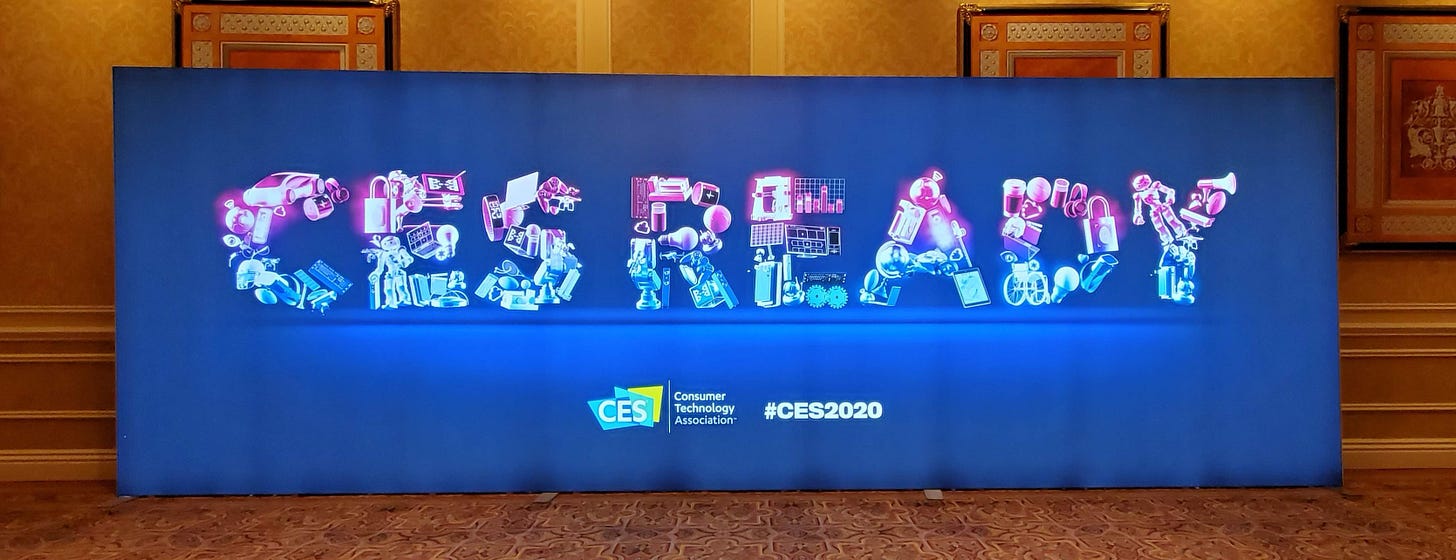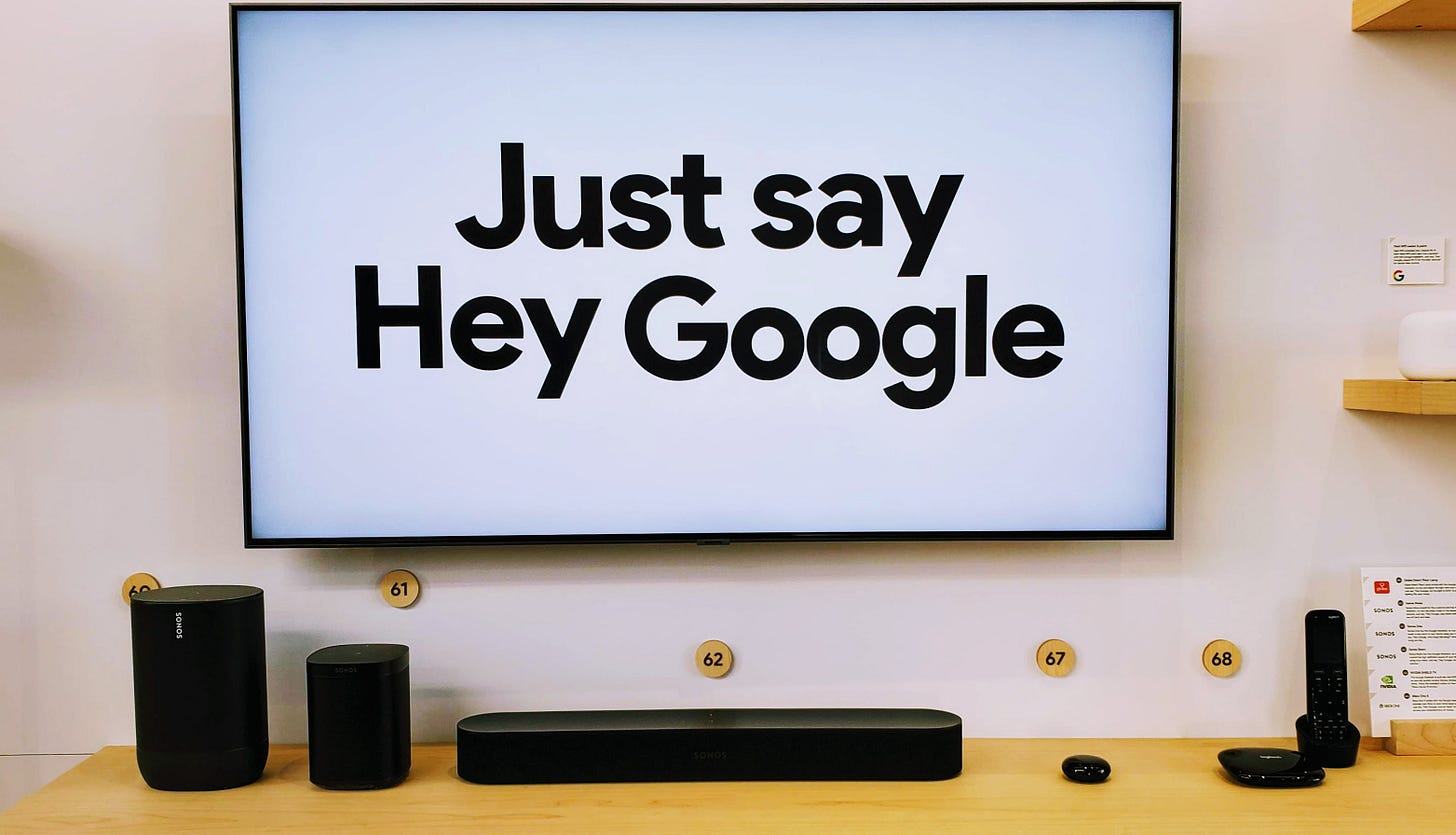CES Debrief: Our So-Called Artificial Life (Filed #012)
Recapping the Consumer Electronics Show. Plus, the oral history of rickrolling, how to fix the internet, and Ivanka Trump and women in tech.


Welcome to the post-CES edition of Filed!
After a week in Las Vegas checking out not only the newest gadgets but concepts tech companies envision could be in our future, it’s time to make sense of the show. In my last newsletter, I highlighted key themes to look out for at CES, but now that it’s over, what should we make of the state of tech? For me, it’s not that connected devices will continue to proliferate but that our entire life is now being artificially enhanced—we are, or will soon be, one and the same with technology.
Humanity extended
At one time, our life and technology were separate entities—we were able to function as human beings without being so dependent on these gadgets. But now it’s more symbiotic, an extension of humanity. It’s our artificial life. While we’re fawning over the latest 8K televisions, foldable displays, self-driving cars and robots, the overarching theme I saw is that these innovations are designed to be an extension of who we are.
Televisions are more connected but are being designed to blend more into its surroundings but accessible in a way commonly seen in science-fiction shows, cars are becoming more intellectual thanks to Alexa and autonomous technology from Qualcomm, Amazon and other companies, and artificial intelligence (AI) is being integrated into every device we touch or own now, from bathroom mirrors to refrigerators.
Samsung perhaps positioned this best, announcing we’re now in the “age of experiences” in which hardware and software combine to produce personalized experiences that make our lives “more convenient, more enjoyable, and more meaningful.” 2020 Democratic presidential candidate and Venture for America founder Andrew Yang has brought up automation and AI as having an impact on the working class and offered up Universal Basic Income as a way to combat job loss. Though CES is largely showcasing consumer tech, it’s not hard to recognize that robots will serve an integral part in how society functions in the coming years, from serving us coffee to getting us around town.
Privacy versus convenience

Where do we draw the line on being connected, though? Privacy was a discussion point at CES with Apple, Facebook and Google at least talking about it but with the growing number of devices and services tracking our whereabouts and requesting access to our data, how much do we have to sacrifice for convenience? Should there have been more of a conversation by these “smart” companies about how they’re respecting our privacy?
As we praise innovations in transportation, the home, sexual health, accessibility, entertainment and productivity, would it be sensible to also explore how much is too much? A conversation I had with friend and analyst Jean-Baptiste Su earlier in the week raised the point that the outrage bar is too high for us, meaning we’ll largely side with convenience instead of pushing for privacy controls.
Is this true for you?
The future of t̶e̶c̶h̶ life
Much of this shouldn’t be surprising as tech has long been moving in this direction, with Google, Amazon, Apple plugging their smart assistants into everything, the explosion of AI in smart devices, televisions doing more than just being the “idiot box”, and more mobility services becoming available no matter where you are or what you’re doing. But looking at the big picture of this year’s CES, it was more than a single theme, but that tech and humanity are slowly merging to become one and the same. We’re no longer batting an eye when talking to a robot when it comes to customer service, using AI to help us navigate around town, or putting on goggles to help us envision an alternate universe or see a different existence.
We are nearing the tech utopian world seen in many science-fiction worlds, be it Back to the Future, Demolition Man, Star Trek, or even The Expanse. Who knows how tightly integrated our lives will become with tech over the next decade?
» Read all the news and product announcements from CES 2020.
P.S.: I’d appreciate it if you added this Filed email address to your address book so it doesn’t get blacklisted or labeled as “spam” accidentally. Thanks!

If you’re looking for more up-to-date news about tech, check out my Flipboard magazine “FYI”. You can also follow my magazine “The Long Sunday Read” for great long-form articles about the tech industry. Both magazines are updated regularly.

Every week, Digital Trends and Flipboard produce a segment called “Tech Briefs” where we cover the week’s top tech news in 10 minutes (or so). It’s also available as an audio-only podcast so please subscribe to it in your favorite app (Spotify, Google Play, Apple Podcast, Stitcher, and Soundcloud) because we oftentimes put together some exclusive episodes!
Since it was CES week, we aired three special episodes of #TechBriefs and you can find them all, and all the other episodes, on my YouTube channel. But here’s the last episode where I join Greg Nibler and TV personality Maude Garrett to recap everything we loved and hated about CES 2020.
» To see more episodes of “Tech Briefs,” subscribe to my YouTube channel.

How to Fix the Internet With a Single Regulation
Douglas Rushkoff, Medium
Algorithms have led to filter bubbles and fueled polarization. It’s time to bring back the tech for a shared reality.
‘Chaos Is the Point’: Russian Hackers and Trolls Grow Stealthier in 2020
Matthew Rosenberg, Nicole Perlroth and David E. Sanger, The New York Times
American defenses have vastly improved in the four years since Russian hackers and trolls mounted a broad campaign to sway the 2016 presidential election. Facebook is looking for threats it barely knew existed in 2016... Voting officials are learning about bots, ransomware and other vectors of digital mischief. Military officials are considering whether to embrace information warfare and retaliate against election interference by hacking senior Russian officials and leaking their personal emails or financial information.
Yet interviews with dozens of officials and experts make clear that many of the vulnerabilities exploited by Moscow in 2016 remain.
Paging Dr. Google: How the Tech Giant Is Laying Claim to Health Data
Rob Copeland, Dana Mattioli and Melanie Evans, The Wall Street Journal
The company has struck deals that grant it access to millions of patient records.
Dispatches From The Front Lines Of Silicon Valley Sexism
Anna Wiener, ELLE Magazine
For nearly five years, writer Anna Wiener had a front-row seat to San Francisco’s technology start-up revolution—where placating the male ego became her new MO.
Fax on the beach: The story of the audacious, visionary, totally calamitous iPad of the '90s
Ernie Smith, Input
AT&T's EO Personal Communicator was going to change everything. Too bad nobody cared.
Ivanka Trump disrupted the conversation about women in tech
Jessica Conditt, Engadget
While saying nothing about them.
An Oral History of Rickrolling
Brian VanHooker, MEL Magazine
From the pages of 4chan to the White House, the story behind the meme that’s never going to give you up.
Hackers Are Breaking Directly Into Telecom Companies to Take Over Customer Phone Numbers
Joseph Cox, Motherboard
SIM swappers have escalated from bribing employees to using remote desktop software to get direct access to internal T-Mobile, AT&T, and Sprint tools.
Why your favorite celebs are ditching Twitter for an app you’ve never heard of
Jeff Beer, Fast Company
For two decades, we’ve been told that stars are just like us. Now celebrities are taking back their power. Will the internet ever be the same?
Dating apps need women. Advertisers need diversity. AI companies offer a solution: Fake people
Drew Harwell, The Washington Post
Artificial intelligence start-ups are selling images of computer-generated faces that look like the real thing, offering companies a chance to create imaginary models and “increase diversity” in their ads without needing human beings.

Thanks for not only subscribing but reading my newsletter. I hope you found it both enjoyable and informative. I encourage you to check out my Flipboard magazines and follow me on Twitter, Facebook, and LinkedIn. And please send me your feedback: how can I do better? Worse? Things you’d like to see featured?
If there are articles you think I might be interested in and should add to a future issue of Filed, please send it to me! I love to discover great content!
I’m off to scour the internet for more news…check your inbox next week for another issue of Filed.


